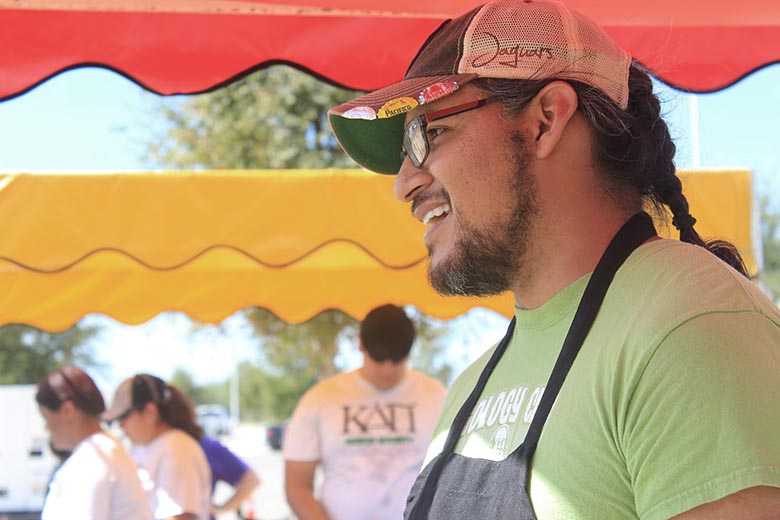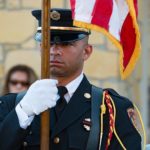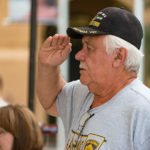Higher Ed supports military community

Biology major, Joel Reyna, participates in Fall Fest with his student organization. Photo by Kim Rivera
When Joel Alexander decided to transition from the military into college, he was 23 years old and a retired Army veteran.
When he retired from his profession as an Army healthcare specialist, or medic, Alexander’s first steps were into the hallways of Northwest Vista College, in San Antonio.
The campus felt foreign to him.
“It kind of felt like high school 2.0,” said Alexander, senior biology major at Texas A&M University-San Antonio. “I felt a little bit old being there.”
According to 2013 statistics gathered by the VA Campus Toolkit—a resource created by the National Center for PTSD—over 1,000,000 student veterans used their GI Bill benefits to pursue higher education.
The GI Bill, enacted in 1944, directly influences total enrollment at A&M-San Antonio, attracting a growing percentage of student veterans looking for a military-friendly college.
This statistic points toward the sudden growth A&M-San Antonio experienced since 2009.
According to Jane Mims, director of Institutional Research, military affiliated students made up about 10 percent of the student population during fall 2009. Now these students represent just over 16 percent of enrollment on campus, or approximately 893 students.
Historically, military-affiliated students choose undergraduate programs including the Bachelor of Applied Arts and Sciences (BAAS), criminology, and interdisciplinary studies.
They favor graduate programs in business administration and counseling and guidance.
This year, at the undergraduate level, psychology and kinesiology are also popular choices, Mims said.
University Support
After six years of service in the U.S. military, Alexander began a career in the civilian world and knew he needed the college degree to accomplish his goals.
But making the change on his own wasn’t as easy as he expected.
“There was some adjusting needed, but mostly on my part as a person, an individual,” Alexander said. “I don’t really ask other people to bend or to adjust themselves to me.”
For most military students experiencing a new campus the first step is not always easy.
Across the country, universities have responded to the influx of military personnel transitioning to university life, creating organizations to help veterans on campus.
In 2014, A&M-San Antonio opened the Patriots’ Casa, specifically to guide veteran and active military students through their transitioning process.
Richard Delgado, Jr., director of military affairs and an U.S. Marine Corps Veteran, works directly with these students from the very beginning.
“We can get in the process from start to finish,” Delgado said. “Our teams go out to assist our admission counselors and our recruit team when it’s a specific military event.”
When military affiliated students first apply to the university, Delgado personally sends these students a welcome and thank you letter for their application. Once admitted, students will receive a letter once a semester reminding them of the benefits Patriots’ Casa has to offer.
For some students, this initial outreach is beneficial and provides them with an easier transition process.
“It’s amazing coming here,” Jason Opalinski said, junior special education major. “Finding that structure early on when you get out is probably the best option.”
Opalinski served in the Army from July of 2000 through July of 2004.
After enduring the repercussions of the 9/11 attack and a deployment to Iraq from 2003 to 2004, Opalinski retired as an E4 specialist in the U.S. Army.
With six years of military experience, he transitioned to the corporate world and adopted various professions including working as a juvenile corrections officer to a child’s support officer for the Attorney General’s office. Opalinski then decided on becoming a student again to further his career.
Opalinski says Veteran Affairs offers many different programs that provide financial assistance to former military personnel who decide to attend college.
This VA-administered program offers veterans the possibility of paid-in-full tuition, known as the Post 9/11 GI Bill.
According to the U.S. Department of Veteran Affairs, if a veteran has at least 90 days of aggregate active duty service after Sept. 10, 2001, and are still on active duty, or if you are an honorably discharged Veteran or were discharged with a service-connected disability after 30 days, you may be eligible for this VA-administered program.
With the financial situation covered, Opalinski said there were remaining difficulties to the new environment outside of military life.
“You go from something so structured, basically being told what to do for four years of your life,” Opalinski said. “And then when you get out and you’re basically on your own…then you say ‘now what?’”
To guide students through this period, the Department of Veteran Affairs at A&M-San Antonio implemented a new method of tracking all veteran, or active military, students once enrolled at the University.
Military students have their own banner I.D. and the Patriots’ Casa tags each one to keep track of them, Delgado said.
“We can help in the admission process but we do not make the determination,” Delgado said. “We can assist in making sure they get their necessary documents and fixing any hiccups.”
In addition, the university’s Veteran Affairs office offers Cultural Competency Training for campus faculty. The training, designed by K.C. Kalmbach consists of three online modules and two in-person training sessions. Faculty become better aware of how to interact and teach veteran students.
“We want the students to realize that they should be able to reach out to their professors,” Delgado said. “A lot of what we suggested can be used for all disciplines. While it is military in theme, it can be used for everybody.”
Recognizing the difficulties for veterans transitioning from military life to higher education, the Patriots’ Casa offers programs and services to support and ease the challenges they face.
Delgado said he hopes to hire an academic counselor in the Patriots’ Casa during the Fall 2016 semester to offer additional help for students choosing a career path.
“I wish they would promote [going to school] when you’re transitioning out of the military,” Opalinski said. “With this being a military embracing university, they take it a step further.”
More Stories
-
- Collective Corps
Slideshow: 17th annual U.S. Military Veterans Parade
-
- Campus
Ground Zero Exhibit
-
- Collective Corps
Viewpoint: free college undermines the military



